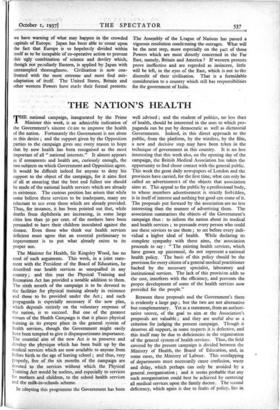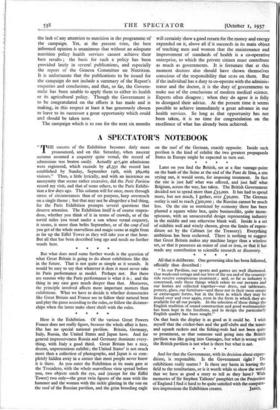THE NATION'S HEALTH
THE national campaign, inaugurated by the Prime Minister this week, is an admirable indication of the Government's sincere eesire to improve the health of the nation. Fortunately the. Government is not alone in this desire ; and the support given by the Opposition parties to the campaign gives one every reason to hope that by now health has been recognised as the most important of all " national interests." It almost appears as if armaments and health are, curiously enough, the two subjects on which Government and Opposition agree. It would be difficult indeed for anyone to deny his support to the object of the campaign, for it aims first of all at ensuring that the best and fullest use should be made of the national health services which are already in existence. The curious position has arisen that while some believe these services to be inadequate, many are reluctant to use even those which are already provided. Thus, for instance, it has been pointed out that, while deaths from diphtheria are increasing, in some large cities less than 5o per cent. of the mothers have been persuaded to have .their children inoculated against the disease. Even those who think our health services deficient must agree that an essential preliminary to improvement is to put what already exists to its proper use.
The Minister for Health, Sir Kingsley Wood, has no need of such arguments. This week, in a joint state- ment with the President of the Board of Education, he described our health services as unequalled in any country ; and this year the Physical Training and Recreation Act has provided a notable addition to them. The sixth month of the campaign is to be devoted to the facilities for physical training already in existence and those to be provided under the Act ; and such propaganda is especially necessary if the new plan, which depends entirely on the voluntary response of the nation, is to succeed. But one of the greatest virtues of the Health Campaign is that it places physical training in its proper place in the general system of health services, though the Government might easily have been tempted to give it disproportionate importance. The essential aim of the new Act is to preserve and develop the physique which has been built up by the medical services which are now available to anyone from before birth to the age of leaving school ; and thus, very properly, five of the six months of the campaign are devoted to the services without which the Physical Training Act would be useless, and especially to services for mothers and children, to the school health services and the milk-in-schools scheme.
In adopting this programme the Government has been well advised ; and the student of politics, no less than of health, should be interested in the uses to which pro- paganda can be put by democratic as well as dictatorial Governments. Indeed, in this direct approach to the public, from the platform, by the wireless, by the film, a new and decisive step may have been taken in the technique of government in this country. It is no less interesting that this week also, on the opening day of the campaign, the British Medical Association has taken the opportunity to find closer contact with the general public. This week the great daily newspapers of London and the provinces have carried, for the first time, what can only be called an advertisemert of the objects that association aims at. This appeal to the public by a professional body, to whose members advertisement is strictly forbidden, is in itself of interest and nothing but good can come of it. The proposals put forward by the association are no less interesting than the manner of advertising them. The association summarises the objects of the Government's campaign thus : to inform the nation about its medical and health services ; to persuade every person who could use these services to use them ; to set before every indi- vidual a higher ideal of health. While declaring its complete sympathy with these aims, the association proceeds to say : " The existing health services, which have grown up piecemeal, do not represent a national health policy. The basis of this policy should be the provision for every citizen of a general medical practitioner backed by the necessary specialist, laboratory and institutional services. The lack of this provision adds to the cost, interferes with the efficiency, and prevents the proper development of some of the health services now provided for the people."
Between these proposals and the Government's there is evidently a large gap ; but the two are not alternative but complementary. Yet as a statement, from an authori- tative source, of the goal to aim at the Association's proposals are valuable ; and they are useful also as a criterion for judging the present campaign. Though it deserves all support, in some respects it is defective, and this itself may be due to deficiencies in the organisation of the general system of health services. Thus, the field covered by the present campaign is divided between the Ministry of Health, the Board of Education, and, in some cases, the Ministry of Labour. This overlapping of .departments must necessarily cause confusion, waste and delay, which perhaps can only be avoided by a general reorganisation ; and it seems probable that any such reorganisation could best be achieved by centering all medical services, upon the family doctor. The second deficiency, which again is due to faults of policy, lies in the lack of any attention to nutrition in the programme of the campaign. Yet, at the present time, the best informed opinion is unanimous that without an adequate nutrition policy health services cannot achieve their best results ; the basis for such a policy has been provided lately in several publications, and especially the report of the Geneva Committee on Nutrition. It is unfortunate that the publications to be issued for the campaign do not include a summary of the Report's enquiries and conclusions, and that, so far, the Govern- meht has been unable to apply them to either its health or its agricultural policy. Though the Government is to be congratulated on the efforts it has made and is making, in this respect at least it has generously chosen to leave to its successor a great opportunity which could and should be taken now.
The campaign which is to run for the next six months will certainly show a good return for the money and energy expended on it, above all if it succeeds in its main object of teaching men and women that the maintenance and improvement of standards of health is a co-operative enterprise, to which the private citizen must contribute as much as governments. It is fortunate that at this moment doctors also should have shown themselves conscious of the responsibility that rests on them. But if the individual has a duty to co-operate with the adminis- trator and the doctor, it is the duty of governments to make use of the conclusions of modern medical science. Experts often disagree ; when they do agree it is folly to disregard their advice. At the present time it seems possible to achieve immediately a great advance in our health services. So long as that opportunity has not been taken, it is no time for congratulation on the excellence of what has already been achieved.







































 Previous page
Previous page